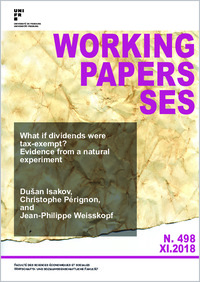What if dividends were tax-exempt? : evidence from a natural experiment
BP2-STS
-
01.11.2018
42
English
We study the effect of dividend taxes on the payout and investment policy of listed firms and discuss their implications for agency problems. To do so, we exploit a unique setting in Switzerland where some, but not all, firms were suddenly able to pay tax-exempted dividends to their shareholders following the corporate tax reform of 2011. Using a difference-in-differences specification, we show that treated firms increased their payout much more than control firms after the tax cut. Differently, treated firms did not concurrently or subsequently increase investment. We show that the tax-inelasticity of investment was due to a significant drop in retained earnings - as the rise in dividends was not compensated by an equally-sized reduction in share repurchases. Furthermore, treated firms did not raise more equity and/or did not reduce their cash holdings to compensate for the contraction in retained earnings. Finally, we show that an unintended consequence of cutting dividend taxes is to mitigate the agency problems that arise between insiders and minority shareholders.
- Collections
- Faculty
- Faculté des sciences économiques et sociales et du management
- Language
-
- English
- Classification
- Economics
- Other electronic version
- Series statement
-
- Working Papers SES ; 498
- License
-
License undefined
- Identifiers
-
- RERO DOC 323686
- RERO R008872929
- Persistent URL
- https://folia.unifr.ch/unifr/documents/307647
Statistics
Document views: 219
File downloads:
- Document: 359
